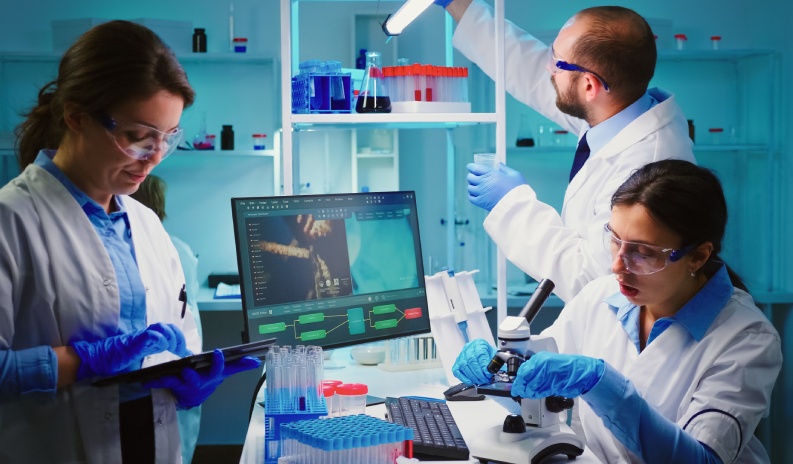A Look at the Future of Clinical Research and Technology
by Ankita Tripathy Technology 31 August 2024

In the world of clinical research, the future is now. With rapid advances in technology and data analytics, the way we conduct research is evolving at an unprecedented pace. This is helping to reshape the entire landscape of clinical trials.
In this article, we explore how technological innovations, such as clinical trial management systems (CTMS), artificial intelligence, and decentralized trial models, are shaping the future of clinical research. Moreover, this article explains its impact on the industry. Furthermore, you will also learn about future trends.
Advancements in Clinical Research: A General Overview

Advancements in clinical research are helping to increase the efficiency and accuracy of trials. Apart from that, diverse populations now have better access to clinical resources. Moreover, these advancements are also helping in the personalization of clinical treatments.
With the introduction of CTMS platforms, there has been a revolution in the management of clinical trials. Basically, CTMS helps clinics streamline processes, enhance data accuracy, and improve communication between stakeholders.
Meanwhile, artificial intelligence and machine learning are playing an increasingly important role. These help clinics identify potential candidates for trials, predict outcomes, and even optimize study designs.
On the other hand, wearable technology and remote monitoring devices are enabling decentralized trials. As a result, patients can now participate in studies from the comfort of their own homes. This helps not only to remove geographical barriers but also to improve patient recruitment and retention.
Clinical Research and the Role of Technology

The following are the ways through which technology helps in clinical research:
1. Better Healthcare Outcomes
Primarily, clinical research is one of the core pillars of medical science. Here, the focus is to improve healthcare outcomes by testing new drugs, treatments, and medical devices.
2. Advancement of Research and Clinical Knowledge
Through careful and comprehensive studies, researchers aim to gather evidence on the safety and efficacy of novel interventions. Hence, they ultimately contribute to the advancement of medical knowledge and patient care.
However, this process is inherently complex, highly regulated, and often time-consuming. Hence, researchers need to provide meticulous attention to detail, accuracy, and efficiency at all stages.
3. More Speed and Precision in Data Collection and Analysis
From patient recruitment and data collection to trial management and regulatory reporting, there are significant demands from clinical researchers. Hence, technological integration is becoming increasingly vital.
This is where cutting-edge technology comes into play. It can transform the landscape of clinical research. With the advent of new-age software systems, researchers can collect, process, and analyze data with both speed and precision.
Some examples of these technologies include clinical trial management systems (CTMS), electronic data capture (EDC) tools, artificial intelligence (AI) algorithms, and more.
4. Automation Helps Reduce Human Error
Those new technologies not only streamline administrative tasks but also improve the accuracy of data collection. Hence, it helps to reduce the likelihood of human error. Also, it ensures adherence to stringent regulatory standards.
Furthermore, automation also helps to accelerate trial timelines. This enables faster progression from early-stage research to the approval and market introduction of life-saving treatments.
Why CTMS Is a Game Changer in Clinical Research?
One of the most influential technological developments in clinical research is the use of clinical trial management systems (CTMS). These systems provide a structured environment for managing all aspects of clinical trials.
Moreover, CTMS helps research teams work more efficiently and effectively. For example, it helps in patient recruitment, data management, budgeting, reporting, and more.
An example of such a system is CTMS by my-researchmanager.com. This platform provides a comprehensive solution for managing clinical trials. Thereby, it helps to reduce the complexity of research. Hence, researchers can focus on what really matters, that is, improving patient care.
What are the Major Benefits of CTMS?
Using a clinical trial management system (CTMS) offers numerous advantages that streamline the entire clinical research process, making it more efficient and effective.
Here are the major benefits of using a CTMS in clinical research:
1. Helps Reduce Human Errors
One of the key benefits of using CTMS is that it helps maintain data accuracy. Hence, it reduces the potential for human error.
By automating data entry and integrating with other digital tools, a CTMS minimizes manual processes that can lead to inconsistencies. Hence, the capture and storage of data becomes precise. This accuracy is crucial if you want to maintain the integrity of the research. This is because even small errors can compromise the validity of study results and delay regulatory approvals.
2. Better Compliance with Regulations and Protocols
A CTMS also plays a critical role in improving compliance with regulations and protocols. Strict regulatory requirements govern clinical trials. Hence, adherence to these guidelines is essential to avoid costly delays, penalties, or even trial termination.
In these cases, a CTMS provides built-in compliance checks, automated workflows, and real-time monitoring options. Hence, research teams can align with Good Clinical Practice (GCP) standards, FDA regulations, and other relevant guidelines.
Moreover, with the help of CTMS, you can ensure ethical conduct of trials. Furthermore, you can also meet all necessary legal and quality requirements. As a result, it facilitates smoother interactions with regulatory authorities.
3. Improvement in Communication
In addition to compliance, a CTMS enhances communication within research teams. Also, communication with external stakeholders, such as sponsors, contract research organizations (CROs), and regulatory agencies, becomes better.
4. Better Integration and Access
Centralized platforms allow for seamless information sharing, reducing silos and fostering collaboration among team members. Thereby, it becomes easier for researchers to access and update study data, track progress, and address issues. Basically, it is possible to do all things within a single system.
With this transparency, you can observe improvement in teamwork. Moreover, you can report better to external partners, ensuring that everyone involved in the trial is informed and aligned on the study’s progress.
5. Real-Time Access to Data
Furthermore, real-time access to research data is a powerful feature of CTMS. This helps you make decisions with better insights and in time.
Here, you also get the ability to monitor key metrics and performance indicators as they unfold. As a result, you can quickly identify trends, anticipate challenges, and make data-driven adjustments to the study.
This agility is particularly important in fast-paced environments. In these situations, the ability to adapt to emerging data can significantly impact the trial’s success.
6. Faster Management and Decision-Making
Whether it’s adjusting patient recruitment strategies or modifying protocols, having real-time insights allows for proactive management. Thereby, you can ultimately reduce the time and cost of clinical processes by bringing new therapies to market.
CTMS and Clinical Research: What About the Future?
As technology continues to evolve, CTMS platforms will become increasingly sophisticated. With more advancements in AI and machine learning, CTMS can play a greater role in analyzing large data sets better. This will help researchers to get faster and more accurate results.
Also, there will be more integration with other technologies. For example, integration with electronic health records and mobile health applications will further transform the conduct of clinical research.
The future of clinical research is inextricably linked to technological progress. CTMS systems are at the forefront of this revolution. Hence, researchers can work more efficiently and achieve better results.
Final Thoughts
From this article, it is clear that the integration of technology into clinical research is extremely advantageous. It will not only benefit science but will also have a direct impact on the health and well-being of patients worldwide.
What are your opinions on the role of technology in clinical research? Please share your ideas and opinions in the comments section below.
Additional Reading:



































































































